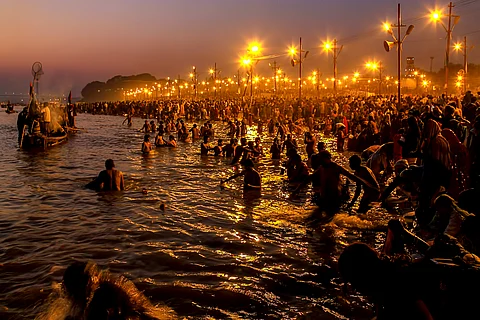
- Topics
- Feature
- Opportunities & Events
- About
- Hindi Portal
- Data
- Topics
- Feature
- Opportunities & Events
- About
- Hindi Portal
- Data

CPCB reverses stance: Kumbh water now deemed fit for bathing
The Central Pollution Control Board (CPCB) has reversed its earlier assessment, now reporting to the NGT that Sangam's water during Maha Kumbh was "fit for bathing." This contradicts their previous declaration of unfitness due to high faecal coliform levels.
The CPCB now cites median values within permissible limits, despite earlier data showing exceedances, and attributes data variability to factors like water flow and currents. The change follows NGT concerns and a claim by UP's CM that the water was even drinkable. (The Tribune)
BWSSB: India's first BIS-certified water board
Bengaluru's BWSSB is the first Indian water board to receive BIS certification for its piped drinking water. This follows a six-month evaluation recognising its adherence to international water quality standards. Deputy Chief Minister D.K. Shivakumar praised the achievement, highlighting the city's commitment to clean water and sustainability. BWSSB Chairman V. Ram Prasath Manohar confirmed the certification covers all aspects of water supply. (The Hindu)
India acts to protect domestic industry with anti-dumping duty on water treatment chemical
India has implemented anti-dumping duties, reaching up to $986 per tonne, on 'Trichloro isocyanuric acid' imported from China and Japan. This chemical, crucial for water treatment, was found to be dumped into the Indian market, causing significant harm to domestic manufacturers. The decision, issued by the Ministry of Finance, follows a thorough investigation and recommendation by the Directorate General of Trade Remedies (DGTR), the commerce ministry’s investigative arm.
The imposed duties, set to remain in effect for five years, aim to create a level playing field for Indian producers and safeguard them from unfair pricing practices. This action, consistent with World Trade Organization (WTO) regulations, underscores India's commitment to protecting its domestic industries while ensuring fair trade practices. (Business Standard)
HC orders VIDC: Resolve water tourism issues, clear encroachments
The Bombay High Court's Nagpur bench directed the VIDC to resolve water tourism policy hurdles and clear Surabardi reservoir encroachments. The court ordered removal of illegal structures, including a Zilla Parishad school and water tank, within two weeks, despite the dilemma of demolishing public infrastructure.
VIDC was also instructed to act against a land lessee for non-compliance with tourism development. The HC criticised the slow implementation of water tourism, noting only six of 96 VIDC reservoirs have operational facilities, and urged the forest department to expedite road project clearances. (The Times of India)
Arunachal Pradesh launches tourism and agriculture policies for growth
Arunachal Pradesh has unveiled new tourism (2025-30) and agriculture (2025-35) policies focusing on sustainable development. The tourism policy emphasizes infrastructure, niche tourism (eco, adventure, wine), community empowerment, and public-private partnerships.
The agriculture policy aims to modernise farming through technology, irrigation improvements, crop diversification, and youth engagement, promoting food security and commercial farming. Both policies align with the Atmanirbhar Bharat vision, fostering local economic growth and employment. (India Today NE)
Maharashtra to form policy against water contamination
Maharashtra will create a policy to stop water contamination and prevent illnesses, following a Guillain-Barré Syndrome (GBS) outbreak in Pune linked to unclean water. GBS treatment is now covered under a state health scheme. The government will also regulate construction near water sources to improve water purity. The Minister stressed the necessity of water purification and acknowledged the role of unregulated construction in contamination. They plan to expand the financial coverage for GBS treatment as needed. (The Print)
India, Nepal partner to strengthen WASH sector
India and Nepal have formalised a collaborative effort to strengthen their partnership in the Water, Sanitation, and Hygiene (WASH) sector, encompassing waste management. This Memorandum of Understanding (MoU) signifies a commitment to addressing critical public health and environmental challenges faced by both nations. The agreement outlines a framework for sharing best practices, technical expertise, and resources to improve access to clean water and sanitation facilities.
Furthermore, it emphasises the importance of sustainable waste management practices to mitigate pollution and promote environmental sustainability. This cooperative initiative aims to enhance the well-being of citizens in both countries through improved WASH infrastructure and services. The partnership also reflects a shared understanding of the interconnectedness of water, sanitation, and hygiene in achieving broader development goals. (Construction World)
This is a roundup of policy updates from the 1st of February 2025 to 15th of February 2025. Read our news updates here